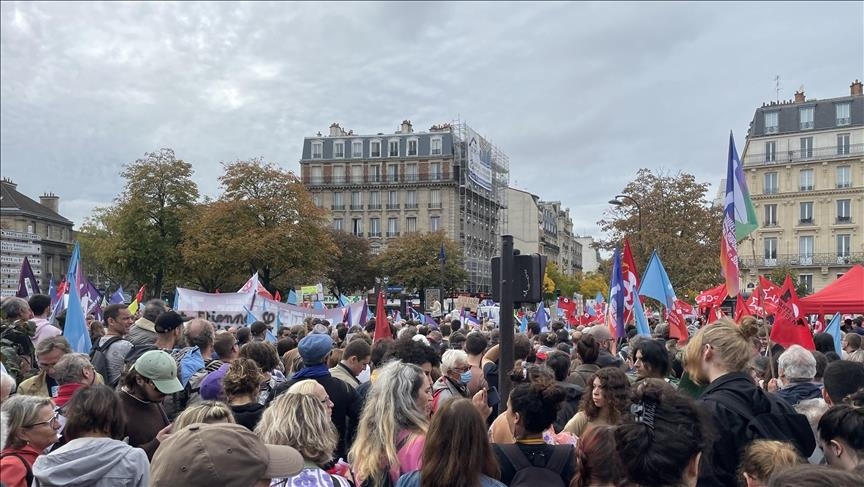ANKARA
France on Thursday woke up to a new day of mass mobilizations against the government’s pension reform.
The government and President Emmanuel Macron are not willing to back-pedal on the pension reform, and the meeting between Prime Minister Elisabeth Borne and trade unions on Wednesday did not give a positive result.
Trade unions and workers remain determined in their objection as this will be the 11th day of mobilization since January, with severe walkouts and nationwide protests.
The national railway company SNCF and Paris regional transportation company RATP said their traffic would be slightly disrupted, according to media reports.
Primary school teachers, energy workers, and those from other sectors walked out while students blocked entry to universities in many cities, including Lyon and Nice.
Violence during protests
Acts of violence stained the protests over the past weeks, when lawbreaker groups set fire to street furniture, various buildings, dumpsters, and trash, and threw projectiles at police.
Police officers arrested hundreds of suspects, and were criticized for disproportionate use of force and arbitrary arrests.
French authorities on Thursday expect up to 800,000 protesters, including 90,000 in Paris, broadcaster BFMTV reported.
A total of 11,500 police officers will be deployed in the country to intervene in possible troubles, including 4,200 in Paris, interior ministry said, according to the daily Le Figaro.
Row between unions, government
Borne on Wednesday received the trade unions’ representatives at her office to discuss the pension reform bill.
The trade union French Democratic Confederation of Labor (CFDT) Secretary-General Laurent Berger told journalists after the meeting: “We are living a democratic crisis. The social crisis is becoming a democratic crisis.”
Borne admitted the disagreement with the unions and described the meeting as a “respectful discussion.”
Berger’s remarks, however, visibly angered the government, according to media reports.
Labor Minister Olivier Dussopt told broadcaster BFMTV that “there is a social crisis, a social conflict, not a democratic crisis.”
Government spokesperson Olivier Veran told the broadcaster France Inter: “We disagree but we talk. Contact resumed, dialogue exists, and we are intending to work with the unions.”
Pension reform plan, source of popular furor
The government revealed the reform project in January and parliament started examining and debating the draft bill the following month.
Workers and trade unions have since expressed growing outrage by holding demonstrations and walkouts against the reform which includes raising the retirement age from 62 to 64 by 2030, requiring at least 43 years of work to be eligible for a full pension.
Political and social tension rose when Macron and Borne decided to use special constitutional powers – Article 49.3 – on March 16 to force the plan through without parliamentary approval.
The decision was driven by fear that lawmakers would be able to block the reforms as the government does not hold an absolute majority in the legislature.
Protests then turned violent when violent groups infiltrated the parades across the country, and police were criticized for arbitrary arrests and disproportionate use of force.

